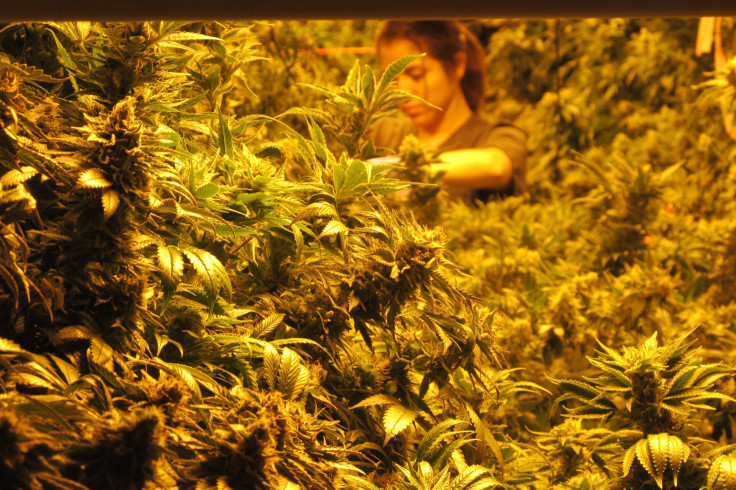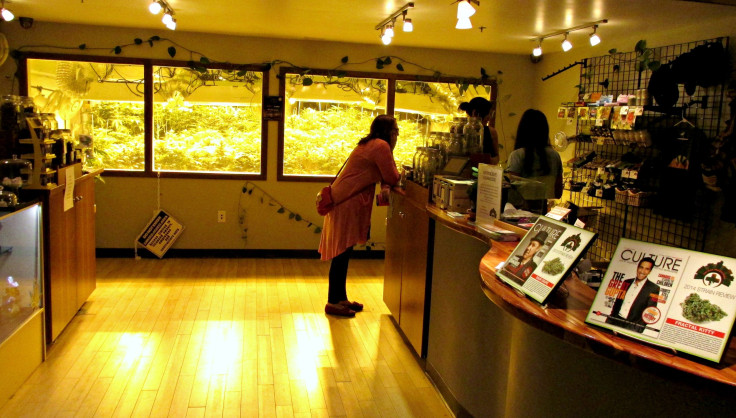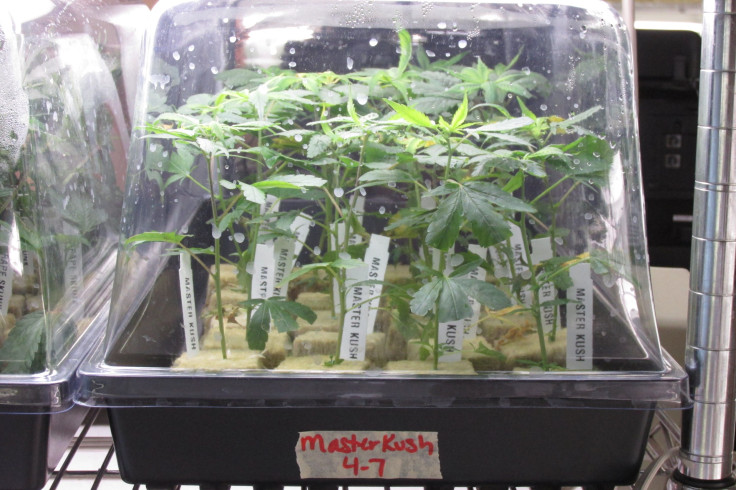Colorado Marijuana Legalization 2015: Fighting The Black Market And The Everyday Challenges Of Selling Legal Weed

DENVER – It turns out selling weed is pretty hard. Contrary to popular belief, selling it legally, at least, isn’t all THC-infused lollipops and rainbows. Just ask David Schwartz.
The six-year cannabis-industry veteran came to Colorado in the '90s from Long Island, New York, after discovering Boulder on his way to a Rainbow gathering in Wyoming. For him, selling marijuana in a locale known around the nation for its liberalized pot laws is not just about counting money; it’s about taxes, regulatory compliance, inventory management, and above all, staying on the right side of Colorado’s “pot cops” -- the Marijuana Enforcement Division (MED).
“Every single aspect of the industry requires a fair amount of consciousness and due diligence,” says Scwhartz. “Your daily sales have to be loaded into MED at the end of the night, all your weights have to be accurate, you have to account for anything that dries up or goes missing. Every day you’ve got to do an accounting of what’s in your inventory.”
Schwartz’s midsize marijuana dispensary, Herban Medicinals, is dotted with encased magazine clips showcasing reviews of the shop’s most popular marijuana strains – names like Sour Grape, Swiss Bliss and Fractal Kitty. The interior would be largely unremarkable if not for the 50 or so marijuana plants growing in a room behind four glass windows that occupy about a quarter of the business.
Schwartz often works out front behind a window where he checks patrons’ IDs before buzzing them into the dispensary. He says when he first got started there were sweeping rules changes on an almost weekly basis, but those have slowed to a more manageable pace as the industry has matured. Another thing that has changed are the attitudes of the customers.
“It’s people coming in and expecting the world and not knowing how much goes into [the business],” he says. “Or [wanting] free this or discounted that, just for showing up. There’s a certain level of expectation or entitlement on the buyer’s end.”

On this afternoon, Schwartz is leaving a voicemail for Brandy who he hopes – really, really hopes – has ensured the quarterly sales tax has been paid. After Brandy, it’s a procession of calls with business associates about potential partnerships and interested buyers. Along with a bevy of other problems, there’s also the question of how to prop up a less-successful wing of his business.
It’s the typical life of a small-business owner. But in addition to the gamut of challenges that face most of the intrepid souls who venture into business for themselves, pot-repreneurs like Schwartz are also confronting a mountain of challenges and limitations exclusive to their industry.
“There’s definitely a lot of hoops to jump through,” says Schwartz. “There’s, like, 200 pages of laws and rules. I can’t really iterate it all. There’s a monthly update and compliance officers; you’re expected to be caught up on anything that’s been laid out as law up until a certain time and then from that time forward they’re basically updating, monthly, the changes that are happening in the industry.”

For marijuana business owners, there are also zoning regulations that keep them 1,000 feet from a school, church or another dispensary; packaging regulations that dictate the exact specifications of the containers in which they can sell their product; a compliance board that mandates tracking for every item sold; state-sanctioned training for all upper-level employees; dueling regulations for medicinal and recreational sales; and a tax code that doesn’t offer the same rewards – such as exemptions for reinvestment of revenue back into the business – as most other small businesses. It’s also virtually impossible to get loans. Since selling marijuana is still a federal offense, almost no bank is willing to work with the industry.
And then there’s another unique problem: the competing black market dealers who have none of the costs of operating a lawful business and often access to product of similar quality. Marijuana advocates long-suggested that legalization would be the key to wiping out the black market for marijuana, but almost a year and a half into the experiment, that hasn’t been the case.
About five miles from Herban, smoke is in the air and a dealer armed with three small baggies of Sour Diesel marijuana is doing business the old-fashioned way. The dealer spoke with International Business Times on the condition of anonymity, in part to avoid possible arrest, but primarily because he fears backlash from people in the legal industry with whom he once worked.
He used to sell marijuana legally, he says. He owned a business that operated out of a modest building in Denver, but he grew disillusioned following what he saw as excessive regulation, uncertainty and taxation. College educated and previously struggling to keep up with the city's rapidly rising rent prices, he says he now operates his marijuana business much the same way he did in high school: out of his car.
The state’s Amendment 64 ushered in a new era of business last year, allowing for marijuana to be sold for recreational as well as medicinal use. That brought a wave of new customers to pot dispensaries and a flood of cash, but it came with a cadre of regulations governing just about every aspect of who, what, when, where and how marijuana could be sold.
Skirting these regulations and free of overhead costs, sales tax and MED regulations, this dealer estimates he’s making two to three times as much money as when he owned his marijuana business. And his clandestine delivery service is just a tiny part of the equation when it comes to the state’s black market.

In March, Colorado authorities announced the arrest of Tri Trong Nguyen, his wife and 30 others in a bust of the largest marijuana-trafficking ring since legalization was passed. Authorities had seized 4,600 pounds of marijuana, nearly 2,000 marijuana plants, 10 pounds of hash oil and about $1.4 million in cash by the time the bust was made public.
"This investigation shut down one of the largest and most sophisticated criminal enterprises uncovered since Colorado voters passed Amendment 20 in 2000," Colorado Attorney General Cynthia H. Coffman said at a press conference following the bust. "Nguyen's drug ring is further evidence of Colorado's thriving black market. Illegal drug dealers are simply hiding in plain sight, attempting to use the legalized market as a cover."
It’s a cover that has been easily and profitably exploited because legalization has given shelter to a number of black-market dealers who no longer need to hide what they’re doing. With so many people now allowed to grow marijuana legally, selling it illegally is now easier than ever.
“Before ... if you had a neighborhood with two people growing weed underground it would be pretty easy to pinpoint and find them,” says Dan Hutchinson, who previously co-owned a medicinal marijuana dispensary but grew tired of the stress that came with the industry and now pushes papers for the government in a job completely unrelated to cannabis.
“Nowadays you have 50 people growing in their neighborhood completely legally or somewhat in a grey area with the caregiver laws, so it’s next to impossible to spot the ones who are doing it illegally.”
A caregiver is a person who legally grows marijuana on behalf of a registered medical patient rather than for a dispensary. And while there’s certainly a profit to be made by selling off additional supply, Hutchinson says that for many growers feeding the black market, it’s often not entirely about the money.
“It goes without saying that a lot of people who are [selling] from their house will have to be getting it from semi-legitimate growers,” he says. “Whether that’s a business person or just a caregiver under the state’s program … the line between drug dealer and friend is increasingly blurred. So selling to your buddy is more like lending a cup of sugar to your neighbor than making a drug deal.”

Colorado law allows caregivers to grow up to six plants each for up to five patients, and more if they are granted a waiver. That allows those individuals to potentially grow a lot of marijuana. In February, a bill was proposed by Colorado state Sen. Irene Aguilar that would require caregivers to register with the state in order to provide services to patients.
Aguilar says she got involved after signing on to work with an interim committee studying Colorado’s marijuana revenue and found that much of the tax dollars the state was expecting weren’t coming through.
Colorado collected $44 million in tax revenue from recreational marijuana sales alone in 2014 and about $76 million in total tax dollars from marijuana, which included medical marijuana tax revenue and various fees. That number was substantial, but was also $26 million below what the state was expecting.
A doctor by trade, Aguilar has become the reticent leader of much of the growing legislation aimed at the marijuana industry. “We were behind it for so long. We had the constitutional amendment passed [legalizing medical marijuana] in 2000 and we didn’t actually regulate it until 2009,” she says. “I wouldn’t say that we’re playing catch-up, but we’re trying not to be reactionary because it’s so new, not only to our state but to the nation. We’re acknowledging that we’re gonna get it wrong and we’re gonna miss some things.”
As they were regulating, lawmakers found that a number of laws aimed at curbing problems created new ones. In May 2010, the state enacted HB1284, which regulated medical marijuana and mandated that anyone growing it outside of the caregiver program had to be part of a registered dispensary. The move was intended to reign in growers who were selling unlicensed plants or excess on the black market, but it also forced a spate of what many in the industry called shotgun marriages between business owners and growers.
Those partnerships often went awry, and when a business failed it left all parties involved without jobs but with a particular skill set and a built-in customer base. That could quickly turn people who had been enterprising business owners into criminals, leading not only to more sellers on the black market, but also more confusion for law enforcement. Aguilar says that even when police would find an illegal grow operation, they often weren’t sure what to do. “Once problems are brought to our attention we’re trying to address them,” she says. “Not having done this, we couldn’t anticipate what the problems were gonna be.”
About a year ago, Colorado revamped its tracking methods for marijuana businesses and introduced METRC, an acronym for the state’s Marijuana Enforcement Tracking Reporting Compliance system. It’s a network that follows every one of the state’s legal marijuana plants from the earliest stages in a grow facility to the final product on shelves and in jars at dispensaries.
Many local dispensary owners support what the state is doing, and those who have stuck it out on the legal side say they expect the black market to eventually fade away. Derrick Levy, a minority owner of Botanacare Dispensary in suburban Denver, says he has seen a drop in sales recently that he attributes at least partially to the black market, but in the long run neither he nor any of the dispensary owners he knows are worried about losing customers.
“I think a year and a half ago, before the METRC program rolled out, there were probably a lot of people on the black market,” says Levy. “But with this new program it’d be a lot of work. And I don’t know if there’s enough people [buying from the black market] to make it work.”
He’s confident that the growth of the legal marketplace and new regulatory frameworks are starting to make operating on the black market more difficult and less cost-effective.
“They’re gonna bleed each other out,” he says. “There’s no profit, really, for these side dealers and people that are doing it, unless you’re a big grower and a damn good grower to have six, seven plants in your basement. Even that’s not a lot of money.”
Research shows he may be right. A July 2014 study found that the market demand for marijuana in Colorado was about 130 metric tons a year. Of that total, only about 60 percent, or 77 metric tons, was supplied by the state’s medical and recreational marijuana supply channels. Colorado has yet to follow up with another study, but Adam Orens, principal of the Marijuana Policy Group and BBC Research, which conducted the study, says he expects the numbers on the state’s recreational marijuana sales to increase, meaning less business for black-market dealers.
“There’s more supply out there on the recreational market than when we wrote that story a year ago,” says Orens. “When the market opened last year most everybody focused on high taxes as why there was not as much participation. Recreational centers were slower to open than was hoped. There just wasn’t enough supply in January to June of last year and that’s for a number of reasons.”
Many of those issues have been resolved, says Orens, and as Colorado has rolled back regulations on who can own a recreational dispensary and allowed growers more freedom he expects the legal marketplace to largely replace the black market in five years’ time.
“I just really see this becoming a very common good that one can buy,” Orens says. “Where the state needs to focus is in effective production management – trying to minimize incentives for the black market, and that means managing the regulated market effectively.”
The METRC system is also helping to crack down on the black market by adding an additional layer of accountability. With its tracking system for every marijuana plant sold legally, METRC aims to keep legal growers’ inventory from occasionally falling off the back of a truck. The system also helps law enforcement more easily differentiate legal operations from illegal ones. To date, the system has registered over 5,000 users and tracked more than 1,000,000 plants and 500,000 packages.
Given that the rapid growth of the industry is driving prices at most Colorado pot shops to around the same as what’s on the street and the fact that dispensaries have products governed by grow laws prohibiting certain pesticides and contaminants, to Schwartz it’s an easy choice.
Black-market dealers are also antithetical to the work most in the industry are doing to try to improve the reputation of marijuana and the people who use and sell it, he says.

“People don’t understand the amount of constraints that are on the industry and what we’re trying to do in order to establish this industry and bring this above board and make this legal for everyone,” says Schwartz. “It sounds a little pretentious, but for me at the core of it it’s an issue about liberty, it’s an issue about freedom.”
Rooting out what remains of the underground market likely means more costs, more regulations and more paperwork for those on the legal side. But that’s life in the marijuana business.
© Copyright IBTimes 2024. All rights reserved.












